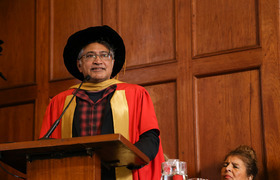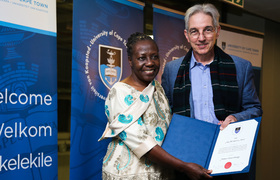Winning book is decolonising religious studies
14 July 2017 | Story Helen Swingler.
Professor David Chidester’s UCT Book Award-winning Empire of Religion: Imperialism and Comparative Religion (University of Chicago Press, 2014) is part of the scholar’s ongoing efforts to decolonise his discipline, the academic study of religion.
The UCT Book Award has been conferred on Chidester at the mid-year graduation ceremony on 14 July. This is his second UCT Book Award. A prolific writer, Chidester won the prize in 1994 for Shots in the Streets: Violence and Religion in South Africa (Boston: Beacon Press, 1991; Cape Town: Oxford University Press, 1992).
The latest work is described in the citation as a “new history of the study of religion that locates knowledge about religion and religions within the power relations of imperial ambitions, colonial situations and indigenous innovations”.
“It uncovers the material mediations in which knowledge about religion was produced during the rise of an academic study of religion between the 1870s and the 1920s in Europe and North America.”
It adds, “By developing a material history of the study of religion, Empire of Religion documents the importance of African religion, the persistence of the conceptual divide between savagery and civilisation, and the salience of complex mediations in which knowledge about religion and religions was produced, authenticated and circulated within imperial comparative religion.”
Decolonising religious studies
Chidester’s research interests lie in the relationships between religion and globalisation, religion and popular culture, religion in society and the problems of social cohesion. He has written extensively on religion in South Africa and North America and on religion and education.
“Twenty years in the making, Empire of Religion is the most recent instalment in my ongoing project of decolonising my discipline, the academic study of religion,” said Chidester, a National Research Foundation A-rated scholar and winner of the 2004 Alan Pifer Award (the Vice-Chancellor’s annual prize that recognises outstanding welfare-related research).
“I have worked on decolonising the study of religion in the Unites States with Salvation and Suicide: Jim Jones, the Peoples Temple, and Jonestown (1988) and in South Africa with Savage Systems: Colonialism and Comparative Religion in Southern Africa (1996).”
Both books received the American Academy of Religion Award for Excellence in Religious Studies.
Reviewers of Empire of Religion, which was also a finalist for the Society of Anthropology of Religion’s Clifford Geertz Prize, have called the book “essential” and “game-changing”.
Chidester is unsure of the latter description.
“I think the reviewer and I would agree that we are repositioning the intellectual enterprise of the academic study of religion within the power relations and material mediations of colonial situations, imperial ambitions, and indigenous creativity.”
Pre-1994 work
Of Shots in the Streets, Chidester said: “[It’s] a book that when I was working on it in the late 1980s I thought would get me deported for quoting banned material from banned organisations. As it turned out, those organisations were unbanned before the book came out. I still have an interest in those organisations.”
 This work is licensed under a Creative Commons Attribution-NoDerivatives 4.0 International License.
This work is licensed under a Creative Commons Attribution-NoDerivatives 4.0 International License.
Please view the republishing articles page for more information.










